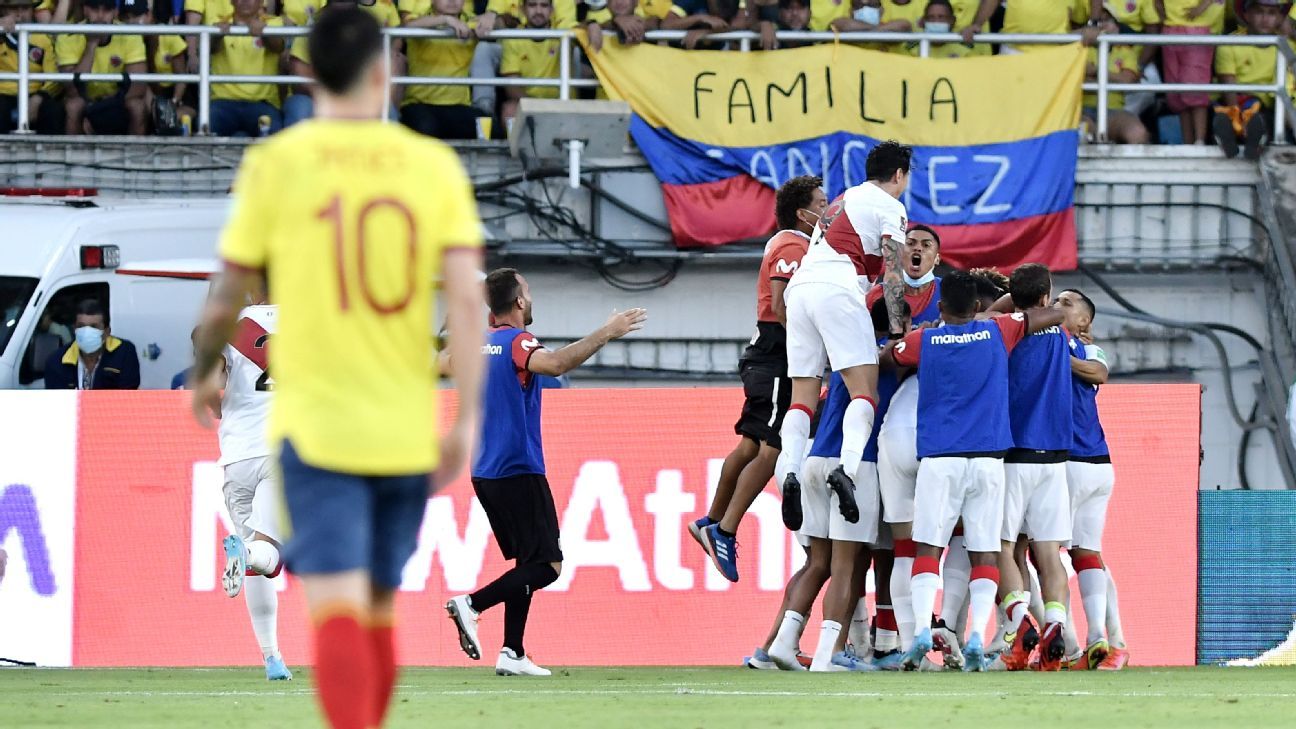Products You May Like
Back in June when they lost 3-0 at home to Colombia, Peru were bottom of South America’s qualification table, with just one point from five games. Ten rounds later the teams met again – and Peru’s 1-0 win now carries them to fourth in the table, the last automatic qualification slot. It has been an extraordinary rally, and this win, in the afternoon heat of Barranquilla, was the most extraordinary so far. Colombia had 30 attempts at goal.
Peru had four — most of them in the Colombian desperation of stoppage time. Luck may have played a part in the Peuvian triumph. But coach Ricardo Gareca is working so well that he and his men are making some of their own luck. In this recovery, just as in the second half of the Russia 2018 campaign and the tournament itself, the Peru side consistently adds up to more than the sum of its parts. The piece of fortune that Peru could hardly make themselves was Colombia’s desperation to score a goal.
– World Cup 2022 qualifying: How it works around the world
– ESPN+ viewers guide: LaLiga, Bundesliga, MLS, FA Cup, more
Astonishingly, a talented squad had failed to find the net in the five previous rounds. Surely it would not become six. Coach Reinaldo Rueda selected his most attacking line up. Juan Guillermo Cuadrado played as an attacking right back, allowing James Rodriguez to drift infield. It was hoped that a fit James would provide the missing spark of creativity. Right at the start Colombia showed their intentions.
Pressing high, Wilmar Barrios won possession, Rodriguez squared and Radamel Falcao Garcia fired just over. With Luis Diaz attacking from the left and Rafael Santos Borre flitting around in support of Falcao, Peru were pinned back. There was relentless pressure. There was a barrage of crosses. There were shots from just outside the area. But there were few clear chances. Peru kept their discipline, headed the crosses away, threw bodies in front of the shots and ran down the clock in the searing afternoon heat.
At half time Gareca was clearly concerned by the Cuadrado-Rodriguez double act operating down his left. On came midfielder Edison Flores to tighten up that flank.But it left Peru more open down the middle. Colombia tried to play their way through. Falcao gave way to Miguel Borja, and as space started to open up his back to goal game started to show, giving Colombia a platform for their attacks. The screw kept tightening. Colombia were clearly over anxious, feeling the effects of so long without scoring. But with the pressure building and Peru not offering the slightest threat, a goal was surely coming.
And then it came. At the other end. With Colombia over-committed, Cristian Cueva got the best of Barrios in midfield for the only time in the game. He slipped a pass into the left channel for the arriving Flores — whose shot beat David Ospina at the near post. It was a gross goalkeeping error — from a keeper who, in fairness, had not been in the match for the previous 84 minutes. And Peru, who surely would have settled for a 0-0 draw and one point, could now celebrate a victory and the full three points.
If Peru’s World Cup quest is on track, the same does not apply to Bolivia, who went down 4-1 away to Venezuela. Going into the game the panorama was clear. So strong at the extreme altitude of their mountain fortress in La Paz, Bolivia would also need a win on the road to put themselves in contention. The clash with the side on the bottom of the table was the best opportunity.
And so coach Cesar Farias prepared an ultra-attacking line up. He fielded a back three made up of two full backs and just one central defender, young Jairo Quinteros, with the idea of having enough defensive pace to stay high up the field putting the opposition under pressure. It might have worked against some of the teams that Venezuela have fielded in this competition.
But not this one. The game marked the debut of vastly experienced Argentine coach Jose Pekerman, now with a shock of white hair. In effect, this was Venezuela’s first step on the road to the World Cup of 2026, and so they were at full strength. Star centre forward Salomon Rondon had only played two of the previous 14 rounds — a creditable 1-0 defeat away to Brazil and a win over Chile, when he was on target. He was on target another three times against Bolivia.
On his own, Quinteros could not cope with the big striker, who helped himself to a hat trick. Bruno Miranda pulled the score back to 2-1 and gave Bolivia some hope. But the improvised back line self destructed. Right sided defender Diego Bejerano played a short back pass, and Darwin Machis raced in to confirm that Bolivia would leave empty handed from another away game.
